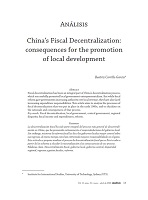China’s Fiscal Decentralization: consequences for the promotion of local development
DOI:
https://doi.org/10.32870/mycp.v11i31.298Keywords:
Fiscal decentralization, local government, central government, regional disparity, fiscal income and expenditures, reform.Abstract
Fiscal decentralization has been an integral part of China’s decentralization process, which successfully promoted local government entrepreneurialism. But while fiscal reform gave governments increasing authority over local revenue, they have also faced increasing expenditure responsibilities. This article aims to analyze the processes of fiscal decentralization that was put in place in the early 1980s, and to elucidate on the rationale and consequences of that process.Resumen:La descentralización fiscal ha sido parte integral del proceso más general de descentralización en China, que ha promovido exitosamente el emprendedurismo del gobierno local. Sin embargo, mientras la reforma fiscal les dio a los gobiernos locales mayor control sobre sus ingresos, al mismo tiempo estos han enfrentado mayores responsabilidades en el gasto. Este artículo se propone analizar el proceso de descentralización fiscal que se llevó a cabo a partir de los ochenta y elucidar la racionalización y las consecuencias de ese proceso.Downloads
References
AHMAD, Ehtisham; Singh, Raju; and Fortuna, Mario 2004, ‘Toward More Effective Redistribution: Reform Options for Intergovernmental Transfers in China’, IMF Working Paper WP/04/98 (June).
ARZAGHI, Mohammad and Henderson, Vernon 2002, ‘Why Countries Are Fiscally Decentralizing’, Department of Economics, Brown University (Dec.).
BARDHAN, Pranab and Mookherjee, Dilip 2005, ‘Decentralizing antipoverty program delivery in developing countries’, Journal of Public Economics, vol. 89, no. 4.
BAHL, Roy 1999, ‘Implementation Rules for Fiscal Decentralization’, paper presented at the International Seminar on Land Policy and Economic Development, Taiwan (Nov. 17).
BAHL, Roy and Martinez-Vazquez, Jorge 2003, ‘Fiscal Federalism and Economic Reform in China’, Working Paper 03-13 Andrew Young School of Policy Studies, Georgia State University (May).

Downloads
Published
How to Cite
Issue
Section
License
Open Access Policy
This journal provides open access to all its contents, in adherence to the principle that making research freely available supports a greater global exchange of knowledge.
MyCP is licensed under a Creative Commons Attribution-NonCommercial license, also known as CC BY-NC.
Contents are published in both PDF and XML formats.
Authors who publish in México y la Cuenca del Pacífico must accept the following conditions:
Pursuant to Mexican copyright laws, México y la Cuenca del Pacífico acknowledges and respects the authors’ moral right and ownership of property rights, which will be assigned to the University of Guadalajara to publish the articles in an open-access mode.
México y la Cuenca del Pacífico does not charge the authors any fees for receiving and processing their articles.
Authors are permitted to enter into other independent and additional contractual agreements for the non-exclusive distribution of the article version published in México y la Cuenca del Pacífico (for example, publishing it in an institutional repository or in other printed or electronic media) as long as they clearly state that the piece was originally published in México y la Cuenca del Pacífico.
Pursuant to the above, once the article is approved for publication, authors must send the Assignment of Rights Agreement form duly filled and signed. This form must be sent to mexicoylacuenca@gmail.com as a PDF file.
Readers/users of México y la Cuenca del Pacífico can freely access the journal new issues as soon as they are uploaded. Readers/users are allowed to cite, share (both electronically and physically), print and distribute the material, provided they expressly state that the work was originally published in México y la Cuenca del Pacífico. Contents are to be properly cited and never for commercial purposes.




